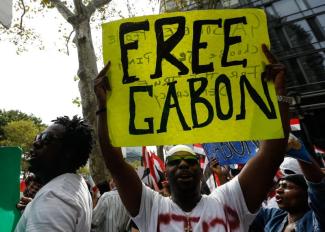Comment
A blow to democracy

The recent events have called into question the reputation of stability that Gabon had forged over the years. They exposed the fragility of the country’s political system. Several factors are relevant to understand the situation.
Gabon is a small Central-African country with a population of about 1.8 million. It is endowed with immense oil reserves and attracts significant foreign direct investments. Its GDP per capita is one of the highest in sub-Saharan Africa. However, the gains are not evenly distributed, and a large majority of the people lives in extreme poverty.
Many people blame this situation on El Hadj Omar Bongo Odimba, the president’s father, who ruled the country from 1967 until his death in 2009. Bongo senior was heavily criticised for using his 42 years in power to amass a colossal fortune and grant privileges to his family and the elite, while the rest of the country remained poor.
Bongo junior became president in 2009 after having been a member of his father’s government for over a decade. His first election was surrounded by tensions, as most people saw it as the continuation of the same unloved regime. Now he secured a second seven-year term. According to his critics, this keeps the status quo and extends the power structure that had been in place for nearly half a century.
Many people had hoped that Jean Ping, the main opposition candidate, might win and bring about change. Two weeks before the election, two other opposition candidates dropped out of the race in order to support him in the hope of ousting Bongo jr. Analysts thought that Ping would certainly win the election.
This is what motivated the opposition to reject the election results announced by the electoral commission on 31 August, decrying a massive fraud by the ruling party. According to the official results, Bongo got 49.80 % of the vote and Ping 48.23 %. These numbers did not correspond with the ones that Ping’s team compiled from copies of vote tally sheets collected across the country. Ping’s team specifically rejected the outcome announced for the province of Haut-Ogooue, the heartland of Bongo’s Teke ethnical group. According to the authorities, the incumbent won 95 % of the province’s vote with a participation rate of 99 %, whereas voter turnout was a mere 59.46 % in the rest of the country.
Protests broke out in the capital Libreville and across the country. There were clashes between opposition supporters and security forces. Several people were killed or wounded, and the National Assembly was set on fire. Many Ping supporters were arrested.
To prove the fact that the election had been rigged, Ping demanded a recount of the vote and wanted the results of every single voting station to be published. France, the EU and the USA similarly demanded more transparency. Under pressure from the international community to use legal means to sustain his claims, Ping formally lodged a complaint with the Constitutional Court, contesting the official results and asking for a recount in Haut-Ogooue.
However, the Court confirmed Bongo as the winner on 24 September, now stating that he had won 50.66 % of the vote. It did not accept the voting tally sheets submitted by Ping’s camp as evidence. However, it highlighted several irregularities in voting counts committed on both sides, thus implying that both parties had cheated. In the days leading to the Court’s decision, the government had deployed additional security forces across Libreville to prevent more protests.
This series of events casts doubt on the substance of Gabon’s democracy. Key institutions involved in the process, including the national electoral commission, the Constitutional Court and the security forces, are controlled by the political group that has been in power for decades. In this context, the prospects of genuine political change are very slim. The population finds itself muzzled by the same institutions that are supposed to safeguard its interests.
Jonathan Bashi is a PhD graduate from the SOAS, University of London’s School of Law. He now works as a consultant and a law professor in the DRC.













